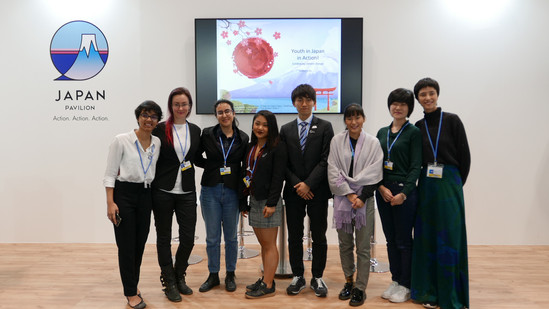What Can I Do About Climate Change in Tokyo?
- Komaba Times
- Apr 28, 2020
- 5 min read
Turns out, a whole lot!
By AMISHI AGRAWAL
“Good morning and welcome! Today, you’re going to hear from 15 speakers or organisations, and the only three things all of us have in common is that we are young, are passionate about combating climate change and are Japanese nationals or residents! While our similarities brought us together, it is our differences that make us interesting – some of us are high schoolers, others dedicated Ph.D students, some are activists and others very niche researchers or leaders of student clubs. We come from different parts of the world and of Japan, but are united in our desire to significantly contribute to the global and local effort to combat climate change!”
Image by Nick Breeze
What you just read was the beginning of an exciting journey, one that started on the morning of 11th December, 2019 at the biggest conference for climate change — COP25 — in Madrid, Spain and one that needs your involvement for what is to come next. Lilian Ono and I hosted a session at the Japanese government’s pavilion titled “Youth in Japan in Action” which featured 15 diverse students and youth organisations from Japan. We organised this session because our passion for climate action makes us cross paths with different kinds of activists and initiatives in Japan — all of them equally inspiring, and amazingly divergent in their approaches — and also many individuals who understand the urgency of climate change, and would join some initiative if it matched their interests and skills. We want to connect these two sides; by unifying our voices — the voices of the youth in Japan — we can achieve a lot. Our voices won’t just add to each other, but will amplify our collective impact. This session was our first step in this direction.
The stories of some of the youth organisations in Japan
Fridays for Future Japan: Starting with the elephant in the room, we were all surprised by what Minori — one of the founders of FFF, Japan — had to say. FFF organises youth-led peaceful strikes in different parts of the world, and is easily the most recognisable youth organisation. But in Japan, their first strike in February 2019 attracted only 12 people. The journey since then has been slow and steady, and now they have over 2000 supporters. One clear aim of FFF Japan is to garner the attention of the public for climate change. When it comes to FFF Japan, you could simply follow them on Facebook and join the next protest, or join the team and help design and plan what comes next!
Spiral Club: Although they were our first remote speakers, their video message was warm and loving — just like their community. An open community from Japan, they give people from all walks of life space to talk about the environment. They publish articles on anything and everything under the sun, such as zero waste, circular economies, and individual stories. They organise workshops, events, cooking parties, book exchanges, and would also love to organise an event around any idea that you might have. Also, they are easily the group you will have the most fun with!
Global Alliance of Universities on Climate: I was overcome with a strong feeling of pride when four of my co-delegates from UTokyo — Emma Saraff, Kotone Kagami, Gen Hayakawa and Jelena Aleksejeva — took the stage. They personified the idea that research must be socially engaged and introduced us to another intriguing organisation — the Global Alliance of Universities on Climate, which consists of 12 universities, including our own, from 6 continents and encourages collaboration and research among many other avenues. Emma introduced us to Climate Action Japan — an English language volunteer group, that aims to support grassroots climate activists and make research more accessible and Jelena works with the National Institute for Environmental Studies — a central research institute in Japan which also organises annual public symposiums in Kyoto and Tokyo.
No Youth No Japan: This group from Tokyo alone has 150,000 followers, and their goal is to connect the youth in Japan with the climate crisis. Their vision includes transitioning to renewable energy and increasing political discussions and understanding of climate change. By working with them you could significantly contribute to adding critical content to public opinion and reach a wide audience!
Students and Clubs within UTokyo: A number of efforts through clubs and individual students are currently underway in UTokyo. There are at least three exciting student clubs on campus — First Access, SUS+, and Echo. From providing solar lanterns to children studying in rural Africa, to collectively understanding climate science and organising our university’s delegation to COP every year, their list of activities is endless! Equally laudable are the efforts of students such asChris Clayton, who works with the Wakupro Foundation and wants to organise a simulative learning event for the SDGs in Tokyo, or Mahi Patki, who has extensive experience on tackling the issue of plastic consumption within educational institutions and would be an exciting partner to work with for something similar within UTokyo! All of these clubs and individuals are buzzing with energy and joining or working with them would be the experience of a lifetime.
SO WHAT COMES NEXT? What can I do?
In case you found any initiative/individual even remotely interesting to you, send me an email at amishiharrypotter@gmail.com. It doesn’t have to be formal, and I will just connect you to the right person. Second, this article is the first step in a longer process of information sharing and collaboration; if you’re aware of other initiatives working on climate change related goals, or could feature an article such as this in your publication/on your social media handle/on your website, do contact me. I also want to launch a website to consolidate information about the plethora of ingenious civil society initiatives in Japan for climate change. We will need all kinds of collaborators — from video-makers and translators to individuals willing to find out about and reach out to different initiatives and groups! If any part of the project sounds slightly appealing to you, email me. Your email does not have to be serious at all — just tell me your name and your initial thoughts, and we will see how it goes from there.
As a final message, I will say that one of the most heart-warming aspects of the youth climate movements is our genuine desire to impact climate change. This means that we are not in it for the media attention this issue has, or for the money. We are not just open to the possibility of collaboration, but are more than willing and eager to do so. So with our new spring semester starting soon, if you believe you’ve found your calling with any of these organisations, send me an email and jump on board. All hands are needed and welcome on deck; we are all in the same boat anyway. Working together is our best bet, and we hope that this article plants the seeds for just that.









Comments